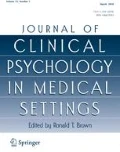Abstract
Insight is a multidimensional construct used in the psychiatric literature to refer to topics, such as awareness of symptoms of illness, awareness of consequences of illness, and perceived need for treatment. The primary aim of the present investigation was to examine both neuropsychological (i.e., executive, attention, and memory skills) and psychological contributions (i.e., depression and anxiety) to one component of insight (i.e., perceived need for medical care) among geriatric inpatients with multiple medical problems. Retrospective chart review involved analysis of data from 47 men who completed a battery of neuropsychological and psychological tests. Findings indicated that perceived need for medical care was significantly and positively related to performance on a test of executive function measuring verbal social reasoning, but not to performance on other tests of cognitive or emotional function. Theoretical and clinical implications of this result are discussed.
Similar content being viewed by others
References
Amador, X. F., Straus, D. H., Yale, S. A., & Gorman, J. M. (1991). Awareness of illness in schizophrenia. Schizophrenia Bulletin, 17, 113–132.
Benedict, R. H. B., Schretlen, D., Groninger, L., & Brandt, J. (1998). Hopkins Verbal Learning Test—Revised: Normative data and analysis of inter-form and test-retest reliability. The Clinical Neuropsychologist, 12(1), 43–55.
Buchanan, A. (1992). A two-year prospective study of treatment compliancein patients with schizophrenia. Psychological Medicine, 22(3), 787–797.
Carsky, M., Selzer, M. A., Terkelsen, K., & Hurt, S. W. (1992). The PEH: A questionnaire to assess acknowledgement of Psychiatric Illness. The Journal of Nervous and Mental Disease, 180(7), 458–464.
Crews, W.D., Jr., & Harrison, D.W. (1995). The neuropsychology of depression and its implications for cognitive therapy. Neuropsychology Review, 5, 81–123.
David, A. S. (1990). Insight and psychosis. British Journal of Psychiatry, 156, 798–805.
Derouesne, C., Thibault, S., Lagha-Pierucci, S., Baudouin-Madec, V., Ancri, D., & Lacomblez, L. (1999). Decreased awareness of cognitive deficits in patients with mild dementia of the Alzheimer type. International Journal of Geriatric Psychiatry, 14(12), 1019–1030.
Dubois, B., Slachevsky, A., Litvan, I., & Pillon, B. (2000). A frontal assessment battery at bedside. Neurology, 55, 1621–1626.
Dunn, L. M., & Dunn, L. M. (1997). Peabody Picture Vocabulary test (PPVT-III) (3rd ed.). Circle Pines, MN: AGS Publishing.
Flashman, L. A. (2002). Disorders of awareness in neuropsychiatric dyndromes: An update. Current Psychiatry Reports, 4, 346–353.
Folstein, M. F., Folstein, S. E., & McHugh, P. R. (1975). “Mini-mental state”: A practical method for grading the cognitive state of patients for the clinician. Journal of Psychiatric Research, 12(3), 189–198.
Kiernan, R. J., Mueller, J., Langston, J. W., & Van Dyke, C. (1987). The Neurobehavioral Cognitive Status Examination: a brief but quantitative approach to cognitive assessment. Annals of Internal Medicine, 107(4), 481–485.
Lysaker, P., & Bell, M. (1994). Insight and cognitive impairment in schizophrenia: Performance on repeated administrations of the Wisconsin Card Sorting Test. The Journal of Nervous and Mental Disease, 182, 656–660.
Lysaker, P. H., Bell, M. D., Bryson, G., & Kaplan, E. (1998). Neurocognitive function and insight in schizophrenia: support for an association with impairments in executive function but not with impairments in global function. Acta Psychiatrica Scandinavica, 97(4), 297–301.
Lysaker, P., Bell, M., Milstein, R., Bryson, G., & Beam-Goulet, J. (1994). Insight and psychosocial treatment compliance in schizophrenia. Psychiatry, 57, 307–315.
Marks, K. A., Fastenau, P. S., Lysaker, P. H., & Bond, G. R. (2000). Self-Appraisal of Illness Questionnaire (SAIQ): Relationship to researcher-rated insight and neuropsychological function in schizophrenia. Schizophrenia Research, 45, 203–211.
Smith, T. E., Hull, J. W., Goodman, M., Hedayat-Harris, A., Wilson, D. F., Israel, L. M., et al. (1999). The relative influences of symptoms, insight, and neurocognition on social adjustment in schizophrenia and schizoaffective disorder. The Journal of Nervous and Mental Disease, 187(2), 102–108.
Sheikh, J. I., & Yesavage, J. A. (1986). Geriatric Depression Scale (GDS): Recent evidence and development of a shorter version. In T. L. Brink (Ed.), Clinical gerontology: A guide to assessment and intervention (pp. 165–173). New York: The Haworth Press.
Starkstein, S. E., Vazquez, S., Migliorelli, R., Teson, A., Sabe, L., & Leiguarda, R. (1995). A single-photon emission computed tomographic study of anosognosia in Alzheimer's disease. Archives of Neurology, 52(4), 415–420.
Stuss, D. T. (1991). Disturbance of self-awareness after frontal lobe damage. In G. P. Prigatano & D. L. Schacter (Eds.), Awareness of deficit after brain injury (pp. 63–83). New York, NY: Oxford University Press.
Van Putten, T., Crumpton, E., & Coralee, Y. (1976). Drug refusal in schizophrenia and the wish to be crazy. Archives of General Psychiatry, 33, 1443–1447.
Yesavage, J. A., Brink, T. L., Rose, T. L., & Lum, O. (1982). Development and validation of a geriatric depression screening scale: A preliminary report. Journal of Psychiatry, 17, 37–49.
Young, D. A., Davila, R., & Scher, H. (1993). Unawareness of illness and neuropsychological performance in chronic schizophrenia. Schizophrenia Research, 10, 117–124.
Author information
Authors and Affiliations
Corresponding author
Additional information
This manuscript is an elaboration of a poster which was presented at the 32nd Annual Meeting of the International Neuropsychological Society in Baltimore, Maryland, USA, in February, 2004 (Whitney, Finna, Hook, & Bieliauskas, 2004).
Rights and permissions
About this article
Cite this article
Whitney, K.A., Finna, J.M., Hook, J.N. et al. Perceived Need for Medical Care in the Geriatric General Medical Population: Relationship to Neuropsychological and Psychological Function. J Clin Psychol Med Settings 12, 309–314 (2005). https://doi.org/10.1007/s10880-005-7816-y
Issue Date:
DOI: https://doi.org/10.1007/s10880-005-7816-y




